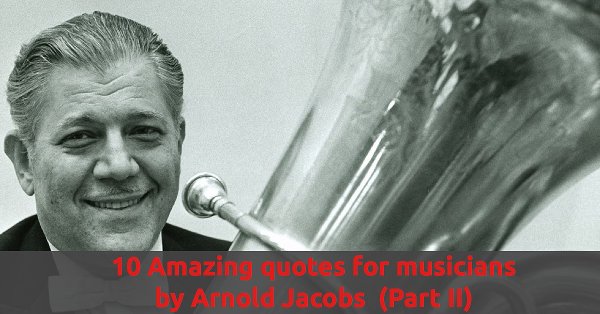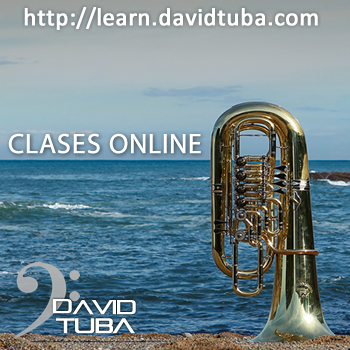11
10 AMAZING QUOTES FOR MUSICIANS BY ARNOLD JACOBS - PART II
Second part of the most famous quotes from Arnold Jacobs.
5th - Establish good breathing habits through exercises away from the horn.
Jacobs believes that shorcuts don´t exist in music, there are just ways to maximise efficiency. Therefore, to play better, we have to use our respiratory system easily and efficiently.We can achieve this through looseness, since a small amount of force can produce a lot of movement. That´s why we should learn how air in movement works, hence the importance of working on breathing individually.
For Jacobs, breathing exercises should be done exaggeratedly and vigorously using a tube, until you feel dizzy. He also thinks this practise should be done over serveral weeks or months, until you have achieved new musical challenges.
Some exercises with the metronome between 60 and 80 beats per minute.
- Inhale for a count of 6, exhale for a count of 6 (repeat 3-4 times). Variations from 10 to 1.
- Exhale for a count of 4, inhale for a count of 1. (Try to work with all breathing capacity)
- Hold a piece of paper in front of your face and blow up until move it.
6th- Set the stage, record, then listen.
Whe should create a circuit, no between our instrument and our ear, but from our instrument to the audience. When we play, we have to use our motor system to influence our sorroundings and not our senses to notice what´s happening around us.
Jacbos recommends we go back to practising in silence: listening when we aren´t playing and mentally reproducing what we have done, or listening to our recording.
7th - By studying sound, you are studying breath.
A. Jacobs focuses his attention on the importance of practising respiration for wind instruments. He emphasizes that we have to focus on the study of breathing itself, and not on the muscles of respiration, since our objetive is music and not physiology.
Jacobs reminds us that our body is too complex to be controlled; musicians obtain results by studying the product, that´s why we have to focus on respiration and not on our body.
The muscles participating in breathing should be uses with as little effort as possible. We should think of a pair of bellows, which move easily and efficiently.
Jacobs says: "Good sound is indicative of good breathing", and this is why we have to use large amounts of air to play.
Lastly, he points out the importance of putting breathing in perspective, since the artist is the one who has the power above all. We must avoid paralysis due to analysis, knowing air should not take up more than 10-20 % of our musical thought.
8th- Always maintain good posture.
For Jacobs, the importance of good posture is essential in the practice of music, since it allows musicians to use their fullest breathing capacity.He insists on the idea that the musician has to feel tall or long. That´s why he recomends we stand up and use our hand to feel the natural curve of our back, just above our waist, and then sit down, maintaining that same posture. We have to feel like our body is very long, as long as possible, so we can let breathing happen in the simplest way possible.
If we succed is doing this, our torso will allow our lungs to expand further. We have to achieve all this in a relaxing way, avoiding stiffness. "Imagine you are a puppet hanging from the ceiling", says Jacobs.
Playing in a upright position will allow us to use the "minimal motors" concept (using only the muscles needed), using as little effort as possilbe. If it´s easier for us to play standing up, it might mean we have poor postures when sitting down.
In conclusion:
Make sure your spine is long before you breath and play in a upright position.
9th- Practice for an audience, not yourself.
With this statement, Jacobs emphasizes mental preparation for practising and performing. We have to think about what we want the audience to perceive before we pick up our instrument.In order to do this, we have to turn notes into sound, telling a story, since all musicians have two instruments:
"one in our hands and another in our ming, and the most importan is the one in our mind"
He points out that our performance is conditioned by the audience. We have to play as often as possible in front of friends, family and colleagues, as well as in concerts and recitals. Jacobs insistis on the idea that, when playing, we have to focus on communicating and not on analysing, since the most importan thing is to send a message to the audience.
Lastly, he reminds us of the importance of recording both practise sessions and performances and the importance of listening, analysing, and comparing these recordings with our ideal concept.
10th- Break phrases into manegeable components.
Short periodos of time of great concentrations are required to learn efficiently (approximately 20 minutes). According to Jacobs, we don´t have to play a song from start to finish whe we are practising. Ideally, we should start our practice with the most difficults parts. In order to learn a song or a passage, we have to practise in a specific tempo, range and volume that allows us to play perfectly, focusing on sound quality and musical performance. Once it is absorbed, we can practice following whe composer´s indications related to tempo speed and dynamics.Jacobs recommends that we always subdivide the rhythm, not only to have a better rhythmic security, but also to perform with authority and achieve a proper balance between breathing, vibration and tonge.
End of part II.
___________
These quotes have been extracted from the Bruce Nelson´s book: Also sprach Arnold Jacobs, which I recommend to read.
You can buy the "Also Sprach Arnold Jacobs" clicking HERE.
Also I would like recomend you other book: Arnold Jacobs: Song and Wind. where you will find an overview of the A. Jacobs life.
You can buy the "Arnold Jacobs: Song and Wind" clicking HERE.














Leave a comment